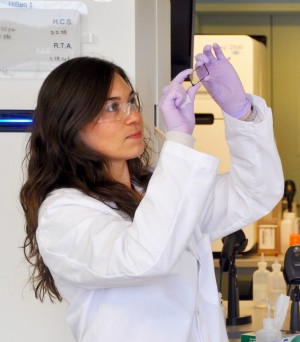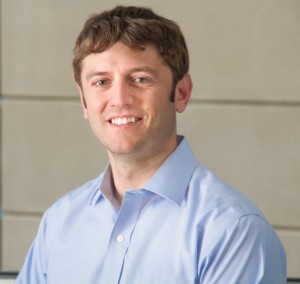Regeneron genetics research shapes future of medical care
From the headquarters of Regeneron Pharmaceuticals Inc. in Westchester, Dr. George D. Yancopoulos visited the White House late last month for a presidential announcement heralding a new venture in gene-focused medical discovery, research and drug development that enlists government agencies, physicians and health care organizations, individual citizens and pharmaceutical companies like Regeneron as partners.
At Regeneron laboratories on the Landmark at Eastview life sciences campus, where Yancopoulos is president and chief scientific officer, scientists have pioneered the kind of work and collaborations described that day by President Barack Obama and first unveiled in his State of the Union Address last month. And Regeneron has expanded and evolved its biomedical research and drug development business to incorporate advances in genetic sequencing and genomics that will drive the new federal initiative.

- Research associate Caitlin Forsythe prepares a microscope flow cell containing human exomes for sequencing at the Regeneron Genetics Center. Photo courtesy of Regeneron
Though its fate in the Republican-dominated Congress is uncertain, the president”™s 2016 budget includes a $215 million investment in a Precision Medicine Initiative that will seek to recruit at least 1 million American volunteers to contribute their health data and DNA samples for analysis and genetic sequencing. The funds will be allocated to the National Institutes of Health, which will develop the million-volunteer national research group for data sharing; the National Cancer Institute, where expanding cancer genomics is an immediate goal of the initiative; the Food and Drug Administration, to develop the regulatory structure and databases needed to safely speed targeted drug therapies into the marketplace; and the Office of the National Coordinator for Health Information Technology, to develop standards that address the highly charged issue of health data sharing and patient privacy.
The Precision Medicine Initiative, according to a White House spokesperson, “will pioneer a new model of patient-powered research that promises to accelerate biomedical discoveries and provide clinicians with new tools, knowledge, and therapies to select which treatments will work best for which patients.”
At the year-old Regeneron Genetics Center, that patient-powered research already is well underway.
A wholly owned subsidiary of Regeneron Pharmaceuticals whose formation was announced at the start of 2014, the genetics center is collaborating with Geisinger Health System in Pennsylvania to collect and sequence patients”™ DNA samples to precisely identify the genetic determinants of human disease. Launched with about 40 employees, the Regeneron subsidiary expects to employ from 50 to 60 scientists “to accomplish the research that we want to do,” said Dr. Aris Baras, executive director of Regeneron Genetics Center.
An integrated health system serving some 2.5 million patients in a largely rural area of Pennsylvania that extends from Pittsburgh to Philadelphia, Geisinger has been “a fantastic partner” for Regeneron, Baras said. That non-academic institutional partner, only the second health system in the nation to adopt the now-mandated Electronic Health Record for safer, more efficient and coordinated patient care, Geisinger has treated multiple generations of family members, providing a rich health care database for analysts and researchers to mine at Regeneron, Baras said.
For Geisinger, the collaboration with the New York biotech company “is about the potential to improve individualized patient care,” said David H. Ledbetter, Geisinger Health System executive vice president and chief scientific officer, when the pioneering partnership was announced last year. “This collaboration has the potential to provide Geisinger with tools to transform our ability to foresee disease before the onset of symptoms, diagnose chronic and potentially fatal conditions before it”™s too late to intervene, and determine how best to optimize the health and well-being for each of our patients.”
As Yancopoulos noted at the start of the Geisinger collaboration, genetics has been central to Regeneron”™s research efforts since the company”™s early years. Arcalyst, the company”™s first FDA-approved drug that went on the market in 2008, “treats a rare genetic disorder,” said Yancopoulos, “and the target of one our product candidates in late-stage development that acts to lower LDL cholesterol was identified using human genetics.”
“With the tremendous recent advances in DNA sequencing, we believe that now is the time to increase our commitment to, and investment in, human genetics research,” Yancopoulos said.
That commitment in the last year has accelerated at a pace exceeding the partners”™ initial plan. Geisinger agreed to collect genetic samples from 100,000 patients who consented to be tested over five years. Baras said Regeneron already has received 50,000 samples, and 25,000 samples have already been sequenced. The partners have raised their sampling goal to 250,000 patients over five years ”” or one-fourth of the national goal for patient volunteers in Obama”™s Precision Medicine Initiative. At Geisinger, Ledbetter has an additional 80,000 patients who have consented to be tested, Baras said.
Since its start with the Pennsylvania partner, the genetics center has forged more research collaborations with Columbia University Medical Center to study the genetic basis of cardiometabolic and other familial diseases; the Clinic for Special Children in Strasburg, Pa., to study the genetic basis of early-onset and familial forms of pediatric disorders in Amish and Mennonite families; and Baylor College of Medicine, studying disease genes discovered by the Baylor Center for Mendelian Genomics.
Baras said it”™s not known what role Regeneron might play in the government”™s Precision Medicine Initiative. “It”™s too early to say. We”™re thrilled that Dr. Yancopoulos was chosen to be part of this discussion.”
“We think it”™s great any time there”™s a big commitment to biomedical research like that”¦For them to be so focused on precision medicine and genomics, something we”™re so passionate about, it has a big impact here.”
